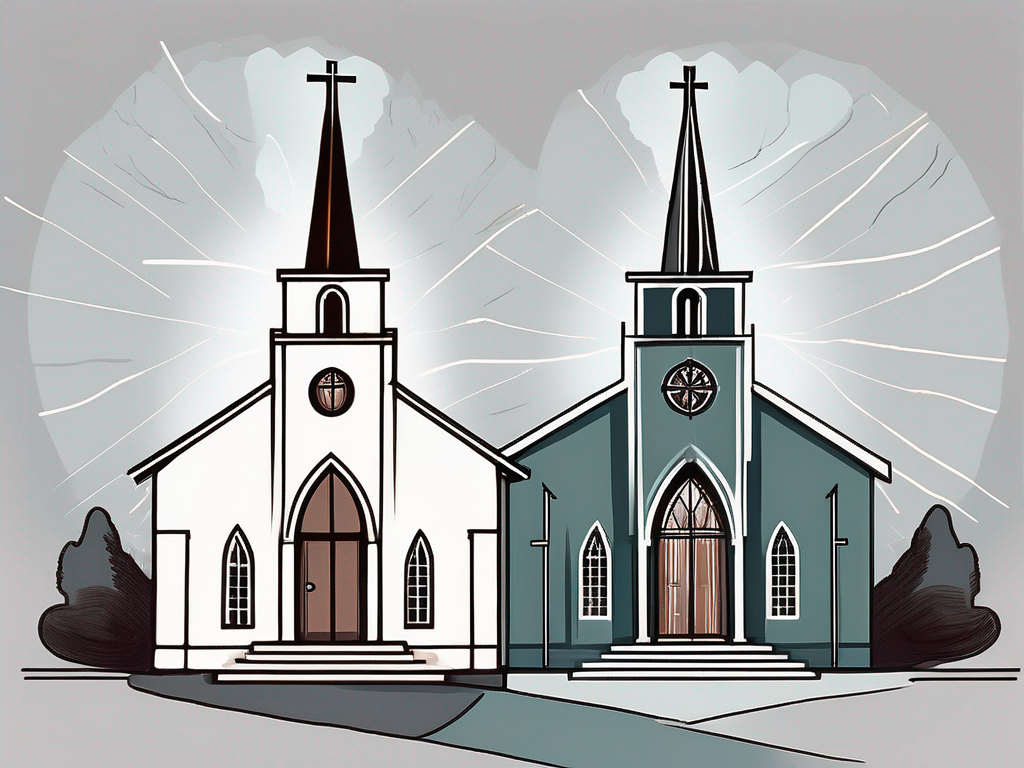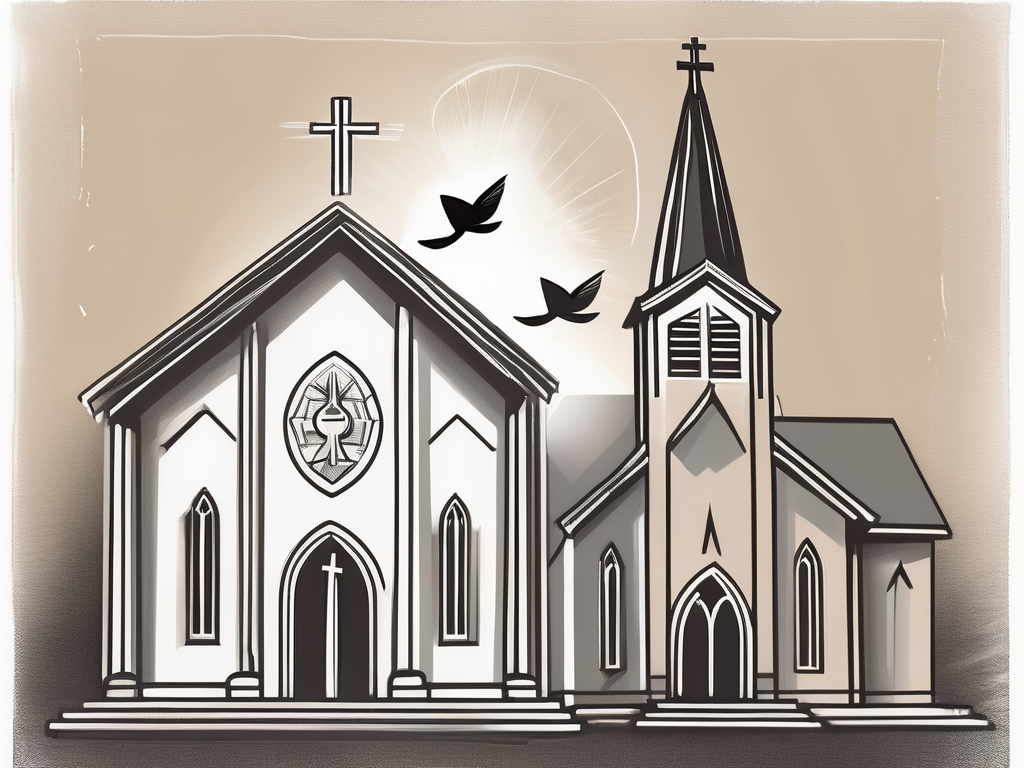Protestantism and Presbyterianism are two distinct branches of the Christian faith, each with its own unique set of beliefs, practices, and traditions. To truly understand the differences between these two denominations, it is important to delve into their historical backgrounds, core beliefs, organizational structures, worship styles, and the role they attribute to the Bible. By exploring these aspects, we can gain a deeper insight into the contrasting approaches that Protestants and Presbyterians take in their religious practices.
Historical Background of Protestantism and Presbyterianism
The roots of both Protestantism and Presbyterianism can be traced back to the sixteenth-century Reformation, a period of intense religious and social change in Europe. Protestantism emerged as a response to the corrupt practices of the Catholic Church, with Martin Luther’s 95 Theses serving as a catalyst for the movement. Luther and other reformers sought to restore the Bible as the ultimate authority in matters of faith and reject certain Catholic teachings and sacraments.
During this time, Europe was undergoing significant political and religious upheaval. The Catholic Church held immense power and wealth, and many people became disillusioned with its practices. Martin Luther, a German monk and theologian, became a central figure in the Reformation. In 1517, he famously nailed his 95 Theses to the door of the Castle Church in Wittenberg, Germany, challenging the authority and practices of the Catholic Church.
Luther’s ideas quickly gained traction, and his call for reform resonated with many who were dissatisfied with the corruption and abuses within the Church. The Protestant movement, as it came to be known, spread rapidly throughout Europe, with various reformers emerging in different regions.
Presbyterianism, on the other hand, has its origins in Scotland during the sixteenth century. It was heavily influenced by John Calvin, a prominent Protestant theologian. Calvin’s teachings and ideas regarding the sovereignty of God and the role of the church in society shaped the foundation of Presbyterian doctrine.
John Calvin, a French theologian, played a significant role in shaping the development of Presbyterianism. His theological works, such as “Institutes of the Christian Religion,” became foundational texts for the movement. Calvin emphasized the sovereignty of God and the idea of predestination, which holds that God has already determined who will be saved and who will be damned.
Calvin’s teachings resonated with many Scots, who were seeking a more disciplined and organized form of worship. The Presbyterian Church in Scotland was established through the efforts of John Knox, a disciple of Calvin, who brought Calvinist ideas back to his homeland.
The Presbyterian Church’s structure and governance are distinctive features of the denomination. It is characterized by a system of representative government, with elected elders playing a significant role in decision-making. This system reflects the belief in the priesthood of all believers and the importance of shared leadership within the church.
Over the centuries, both Protestantism and Presbyterianism have continued to evolve and adapt to changing social and cultural contexts. Today, they are vibrant and diverse religious traditions with millions of adherents worldwide.
Core Beliefs and Practices
Fundamental Protestant beliefs revolve around the concept of salvation by faith alone. Protestants emphasize the importance of personal faith in Jesus Christ as the sole basis for salvation, rejecting the idea that good works play a role in achieving salvation. This belief stems from the Protestant Reformation in the 16th century, led by figures such as Martin Luther and John Calvin, who sought to reform the Catholic Church and return to what they believed were the true teachings of the Bible.
Protestants believe that salvation is a gift from God, received through faith, and not something that can be earned through human effort. This belief is based on their interpretation of biblical passages such as Ephesians 2:8-9, which states, “For it is by grace you have been saved, through faith—and this is not from yourselves, it is the gift of God—not by works, so that no one can boast.”
In addition to salvation by faith alone, Protestants also emphasize the priesthood of all believers. This means that every believer has direct access to God and does not need an intermediary, such as a priest, to communicate with Him. This belief is based on the biblical teachings that Jesus Christ is the ultimate high priest and that all believers are part of a royal priesthood (1 Peter 2:9).
Presbyterian beliefs, on the other hand, are firmly rooted in the Reformed tradition. Presbyterians trace their origins back to the teachings of John Calvin, a 16th-century theologian who played a significant role in the Protestant Reformation. Calvin’s teachings emphasized the sovereignty of God in all aspects of life, including salvation.
One of the key beliefs of Presbyterians is the doctrine of predestination. According to this doctrine, God has already determined who will be saved and who will not. This belief is based on Calvin’s interpretation of biblical passages such as Romans 8:29-30, which states, “For those God foreknew he also predestined to be conformed to the image of his Son… And those he predestined, he also called; those he called, he also justified; those he justified, he also glorified.”
Presbyterians also place a strong emphasis on the sovereignty of God in all aspects of life. They believe that God is in control of everything and that nothing happens without His knowledge and permission. This belief provides comfort and assurance to Presbyterians, knowing that God is ultimately in control and working all things for the good of those who love Him (Romans 8:28).
Furthermore, Presbyterians believe in the responsibility of the church to promote social justice and equality. They believe that the church has a role to play in addressing societal issues such as poverty, racism, and inequality. This belief is rooted in the biblical teachings of justice and compassion for the marginalized and oppressed. Presbyterians are often actively involved in community outreach programs, advocacy for social justice, and humanitarian efforts.
In summary, while both Protestants and Presbyterians share the core belief in salvation by faith alone, they differ in their emphasis on predestination and the sovereignty of God. Protestants emphasize personal faith and the priesthood of all believers, while Presbyterians emphasize the sovereignty of God and the church’s responsibility to promote social justice and equality. These beliefs shape the practices and priorities of both Protestant and Presbyterian communities, guiding their worship, service, and engagement with the world around them.
Organizational Structure and Leadership
Protestant churches generally have a less centralized organizational structure. Each church or denomination has the autonomy to govern its own affairs independently. Congregationalists often have a democratic approach to decision-making, with the congregation collectively making important decisions.
Within the congregationalist tradition, the democratic approach to decision-making is deeply rooted in the belief that every member of the congregation has a voice and should have a say in the direction of the church. This not only fosters a sense of inclusivity and empowerment among the congregation but also encourages active participation in the decision-making process. Congregationalists believe that the collective wisdom of the entire congregation is essential for making important decisions that affect the church’s future.
Presbyterian churches, on the other hand, have a more hierarchical structure. They are governed by a system of elders (presbyters) who work together to make decisions for the church. This model ensures a level of accountability and communal decision-making within the Presbyterian denomination.
In the Presbyterian tradition, the role of elders is highly regarded and carries significant responsibility. These elders, who are elected by the congregation, are seen as spiritual leaders and are entrusted with the task of guiding the church in matters of faith, worship, and governance. The hierarchical structure of Presbyterian churches allows for a clear chain of command and ensures that decisions are made collectively, taking into account the wisdom and discernment of the elders.
Furthermore, the hierarchical structure of Presbyterian churches also promotes a sense of unity and consistency across different congregations within the denomination. This allows for a cohesive approach to theological beliefs, worship practices, and mission initiatives. The collaborative decision-making process within the Presbyterian denomination ensures that the voices of the congregation are heard and considered, while also providing a framework for effective leadership and governance.
Worship Styles and Rituals
Protestant worship practices can vary greatly, reflecting the diversity within the broader Protestant community. Some Protestants favor a more informal and contemporary style of worship, incorporating modern music, charismatic speakers, and interactive elements. This style of worship seeks to create an environment that is engaging and relatable to the congregation, often using multimedia presentations and incorporating personal testimonies. The use of contemporary music, such as Christian rock or gospel, allows worshippers to express their faith in a way that resonates with their everyday lives.
On the other hand, there are Protestants who adhere to more traditional liturgical practices, including hymns, prayers, and structured rituals. These worship services often follow a set order, with specific prayers and readings for different parts of the service. The use of liturgical calendars helps guide the worship experience, with different seasons and feasts having their own prescribed format. This structured approach to worship aims to create a sense of reverence and continuity, connecting the congregation to the historical roots of their faith.
Within the Presbyterian tradition, worship traditions tend to lean towards a more formal and liturgical style. Traditional hymns, scripture readings, and sermons play a central role in these services. The congregation participates in responsive readings and recitations, affirming their faith together. The order of worship is often set according to the liturgical calendar, following a prescribed format for different seasons and feasts. This intentional structure helps to create a sense of unity and shared experience among the worshippers.
Additionally, Presbyterian worship services often incorporate elements of sacraments, such as baptism and communion. These sacraments hold deep significance within the Presbyterian faith, symbolizing the grace and presence of God in the lives of believers. The sacraments are typically performed with great reverence and solemnity, emphasizing the spiritual connection between the individual and God.
Overall, the worship styles and rituals within the Protestant community are diverse and reflect the unique preferences and traditions of each denomination. Whether it is through contemporary and interactive worship or traditional and liturgical practices, the aim of Protestant worship is to create a space for believers to connect with God, express their faith, and experience a sense of community with fellow worshippers.
The Role of the Bible in Protestantism and Presbyterianism
Protestants regard the Bible as the ultimate authority in matters of faith and practice. They emphasize the importance of individual interpretation and believe in the priesthood of all believers, encouraging direct engagement with Scripture. This principle has led to the proliferation of numerous Protestant denominations, each with its own interpretation of biblical doctrine.
Protestants believe that the Bible is not only a historical document but also a living and relevant guide for their lives. They see it as a source of wisdom, comfort, and guidance in their daily walk with God. Through personal study and reflection, Protestants seek to understand the deeper meaning and application of biblical teachings in their own lives.
Presbyterians, on the other hand, hold a high view of the Bible and consider it to be the inspired Word of God. However, they approach biblical interpretation through a more structured lens. The Westminster Confession of Faith, adopted in the 17th century, serves as a guiding document for many Presbyterians, ensuring a consistency in interpretation across the denomination.
Presbyterians believe that the Bible should be interpreted within the context of the historical and cultural background in which it was written. They value the insights of theologians and scholars who have studied the original languages, literary styles, and historical contexts of the biblical texts. This approach helps Presbyterians to understand the intended meaning of the Scriptures and apply them to contemporary issues.
Presbyterians also emphasize the importance of the community in interpreting the Bible. They believe that the Holy Spirit works through the collective wisdom and discernment of the church to guide its interpretation. This communal approach ensures that individual biases and personal interpretations are balanced by the insights and perspectives of others.
In conclusion, while Protestantism and Presbyterianism share a common historical background, they manifest distinct differences in their core beliefs, practices, organizational structures, worship styles, and biblical interpretations. Understanding these key differences is essential for gaining a deeper appreciation of the diversity within the Christian faith and fostering dialogue among believers of different denominations.












